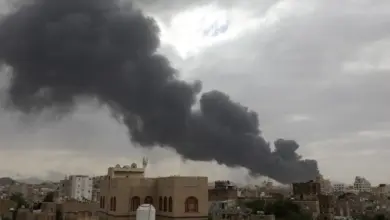
Gulf foreign ministers met Thursday in the Saudi capital for talks on their military operation in Yemen, where Iran-backed Houthi rebels have defied air strikes and refused to give ground.
Ministers from the six-member Gulf Cooperation Council, which includes Bahrain, Kuwait, Oman, Qatar, Saudi Arabia and the United Arab Emirates, huddled in Riyadh as warplanes of the Saudi-led coalition pressed on with attacks on rebel positions.
Qatar's Foreign Minister Khalid al-Attiyah, chairing the meeting, said the air campaign in Yemen demonstrated the Gulf monarchies' commitment to helping their impoverished neighbour.
"The Decisive Storm operation showed the GCC's historical responsibility towards Yemen," he said.
Gulf nations "will work with the international community to achieve legitimacy and unity" in Yemen, he said, before the ministers continued their meeting in a closed session.
The air strikes were launched in late March as the Shiite Houthi fighters and their allies advanced on the main southern city of Aden, where President Abedrabbo Mansour Hadi fled after the rebels seized large parts of the country including the capital Sanaa.
Hadi escaped to Riyadh, which launched the campaign fearing an Iran-friendly regime taking control of its southern neighbour.
Iran has denied charges of arming the rebels, called for an end to the strikes and pushed for a negotiated settlement.
The conflict has heightened tensions in the region and Iran said Thursday that two of its destroyers sent to the Gulf of Aden had reached the entrance of Bab al-Mandab, a strategic strait between Yemen and Djibouti in the Horn of Africa.
Tehran said the destroyers would stay around the strait until late June, but stressed that its ships would not enter the territorial waters of other countries.
The coalition has imposed an air and sea blockade on Yemen.
Last week US officials said an American aircraft carrier and a cruiser left the waters off Yemen and headed back to the Gulf after an Iranian naval convoy also turned back from the area.
Washington suspected the convoy of carrying weapons destined for the Houthis.
Thursday's meeting was aimed at laying the groundwork for a GCC leaders' summit on Tuesday, which will also be attended by French President Francois Hollande.
Fresh strikes, clashes
Leaders of GCC countries — many of which are taking part in the US-led air campaign against the Islamic State group in Iraq and Syria — are also preparing to meet US President Barack Obama in mid-May in Washington.
All GCC members except Oman are part of the coalition that Riyadh assembled for the air war in Yemen.
The coalition strikes continued on Thursday, despite an announcement last week that the campaign was moving into a new phase.
The rebels have refused to withdraw from territory they seized, in defiance of a UN Security Council resolution imposing an arms embargo and sanctions on their leaders.
Warplanes hit Houthi positions in Aden in the districts of Khor Maksar and Dar Saad, helping pro-government forces to retake positions, sources among the southern fighters said.
Eight people were killed in overnight clashes in Aden, including five pro-government fighters and three civilians, the city's health chief Al-Khader Laswar said.
He said 44 others were wounded. Details of losses on the rebel side were not available.
The Houthi fighters have joined forces with troops loyal to former strongman Ali Abdullah Saleh, clashing in Aden with local militia known as "Popular Resistance" units that have sided with Hadi.
Warplanes also hit rebel targets in the central city of Taez, a local government official said, after overnight raids targeted Houthis in the southern provinces of Lahj and Abyan, according to pro-government fighters.
The United Nations says more than 1,000 people have been killed in fighting in Yemen since late March.
Saudi Arabia was represented at Thursday's talks by deputy foreign minister Prince Abdul Aziz bin Abdullah, after Prince Saud al-Faisal stepped down from the post of top Saudi diplomat for health reasons.
King Salman on Wednesday named Saudi Arabia's ambassador to Washington Adel al-Jubeir to replace Saud, who had been foreign minister since 1975.



